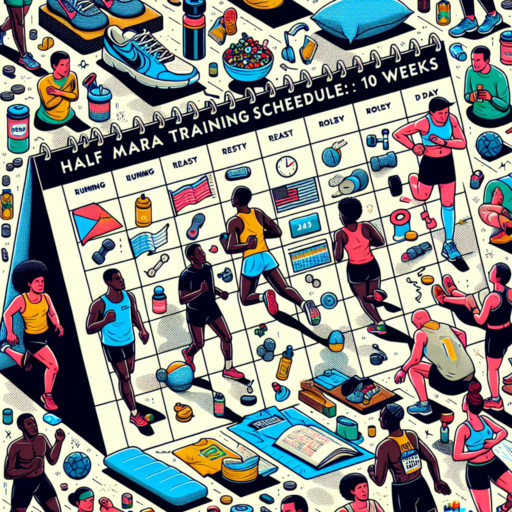What is an Advanced Marathon Training Program?
An Advanced Marathon Training Program is designed for runners who have already experienced the challenge of finishing a marathon and are looking to improve their performance, speed, and overall endurance. This type of program incorporates a mix of rigorous training methodologies including higher mileage, more intense speed work, and sophisticated recovery techniques. With a focus on both physical and mental stamina, the goal is to push athletes beyond their current capabilities.
Unlike introductory programs, an advanced marathon training plan assumes a solid foundation of running. It is structured around critical components such as interval training, tempo runs, long runs at a challenging pace, and strength training. Each element is tailored to elevate a runner’s capacity for endurance and speed, while also integrating adequate rest days to prevent injury and ensure physiological adaptations.
At its core, an advanced marathon training program is about precision and customization. Runners will often work with coaches to adjust the program based on their specific goals, race conditions, and response to training. This holistic approach ensures that the athlete can tackle the marathon distance more efficiently and with a competitive edge.
Key Components of Effective Advanced Marathon Training Programs
Advanced marathon training programs are designed to optimize performance, improve endurance, and reduce the risk of injury for seasoned runners looking to push their limits. These programs, tailored for individuals with a substantial base of running experience, incorporate several key components critical for success. Understanding these elements can help runners craft a training plan that elevates their marathon performance to new heights.
Personalized Training Plans
A cornerstone of effective advanced marathon training is the creation of a personalized training plan. Such plans consider a runner’s current performance levels, goals, and any personal constraints like time and health. This personalized approach ensures that training intensity and volume are aligned with the runner’s capacity, fostering gradual but consistent improvement. Moreover, these tailored plans help in mitigating the risk of overtraining and injuries, which are more common as training demands increase.
Incorporation of Cross-Training
To bolster performance and reduce injury risks, advanced marathon training programs often integrate cross-training activities. Cross-training, which involves engaging in various types of exercise outside of running, supports muscle balance, enhances overall fitness, and aids in recovery. Activities such as cycling, swimming, and strength training are commonly included to complement running, ensuring a well-rounded approach to fitness that keeps the runner’s body well-prepared for the demands of marathon running.
These components, among others, are what make advanced marathon training programs not just about logging miles but about holistic preparation and strategic progress towards peak performance. Tailoring the training to the individual, incorporating varied training methods, and paying attention to recovery are essential elements that distinguish advanced programs from basic training efforts.
How to Customize Your Advanced Marathon Training to Match Your Fitness Level
Every runner’s journey to a marathon is unique, especially when it comes to advanced marathon training. Customizing your training plan to match your fitness level is essential for improving performance, avoiding overtraining, and ultimately reaching your marathon goals. Whether you’re aiming to set a new personal record or to complete a marathon more comfortably, understanding how to tailor your advanced marathon training can make all the difference.
Assessing Your Current Fitness Level
Before diving into the customization of your training plan, it’s crucial to assess your current fitness level accurately. This means considering not only your running pace and endurance but also your recovery capabilities, injury history, and recent running volume. This assessment will serve as the foundation for adjustments in your training intensity, volume, and rest days to better align with your individual needs.
Incorporating Variety in Your Training
To match your training with your fitness level, integrating a variety of workouts is key. This includes a mix of long runs, tempo runs, interval training, and recovery runs. Each type of workout serves a different purpose and contributes uniquely to your overall fitness and marathon preparedness. For instance, long runs boost endurance, tempo runs improve your lactate threshold, interval training enhances speed and efficiency, and recovery runs allow your body to repair and strengthen. By customizing the frequency, intensity, and duration of these workouts based on your fitness assessment, you can create a balanced and effective training plan.
Top Mistakes to Avoid in Advanced Marathon Training
In your journey to conquer the marathon distance, understanding the pitfalls in advanced marathon training is as crucial as the miles you log. Advanced marathon training requires a fine balance between pushing your limits and giving your body the rest it needs. Here, we delve into the common mistakes that can derail even the most disciplined runner’s training regimen.
Neglecting Rest and Recovery
One of the most critical missteps in advanced marathon training is underestimating the importance of rest and recovery. It’s easy to fall into the trap of thinking more miles always mean better performance. However, without adequate rest, the risk of overtraining, injury, and burnout significantly increases. Overtraining not only hampers your body’s ability to perform but also its ability to recover, ultimately leading to diminished returns on your hard work.
Overlooking Nutrition and Hydration
Another common mistake is neglecting the role of nutrition and hydration in your training plan. Proper nutrition and staying hydrated are fundamental in fueling your runs and recovery. A diet lacking in essential nutrients and inadequate hydration can lead to decreased performance, increased fatigue, and a higher risk of injury. Tailoring your nutrition to your training demands is essential for maintaining energy levels and aiding in the recovery process.
Ignoring Injury Warning Signs
Failing to listen to your body and ignoring the early signs of injury can have lasting repercussions on your marathon goals. It’s important to address any aches, pains, or discomfort promptly to prevent minor issues from becoming major setbacks. Incorporating preventative measures, such as strength training and flexibility exercises, into your training can help mitigate the risk of injury and keep you on track towards your marathon aspirations.
Weekly Training Schedule Example for Advanced Marathon Runners
Creating an effective weekly training schedule is crucial for advanced marathon runners aiming to optimize performance and minimize the risk of injury. Advanced runners have surpassed the fundamentals of running and are now focusing on refining their skills, building endurance, and improving their pace. A well-structured training schedule not only keeps runners focused and disciplined but also ensures a balanced approach to intensity, recovery, and cross-training.
Key Components of the Schedule
An advanced marathon training schedule incorporates several key components aimed at enhancing the runner’s capability and endurance. These include interval training, which focuses on high-intensity speed work, tempo runs that help in building pace, long runs to increase endurance, and recovery runs that facilitate physical recuperation. Moreover, incorporating strength training and flexibility exercises is essential to build muscle and prevent injury, creating a well-rounded athlete.
Sample Weekly Layout
A typical week for an advanced marathon runner might look as follows:
- Monday: Recovery Run – 5 miles + Flexibility Exercises
- Tuesday: Interval Training – 8 x 800 meters at race pace with 2-minute recovery jogs in between
- Wednesday: Strength Training + 40-minute Recovery Run or Cross-Training
- Thursday: Tempo Run – 10 miles at a challenging, but sustainable, pace
- Friday: Rest Day or Light Yoga for Runners
- Saturday: Long Run – 20 miles at a comfortable pace, focusing on endurance rather than speed
- Sunday: Strength Training + Flexibility Exercises
It’s imperative for runners to listen to their bodies and adjust the intensity and volume of training accordingly. While this schedule provides a foundation, personalization based on the runner’s unique needs and goals is key to maximizing performance and avoiding burnout.
No se han encontrado productos.
Nutrition and Recovery Strategies for Advanced Marathon Training
For marathon runners at an advanced level, understanding the nuanced relationship between nutrition and recovery is crucial. Balanced nutrition not only fuels long-distance training but also aids significantly in the post-exercise healing process. When optimal nutrition is paired with effective recovery strategies, athletes can see a profound impact on their performance and overall health.
Optimizing Macronutrient Intake
Macronutrients—carbohydrates, proteins, and fats—play foundational roles in a marathon runner’s diet. Carbohydrates are the primary energy source for long runs, making up about 55-65% of a runner’s dietary intake. Proteins are essential for the repair of muscle tissues, while fats support sustained energy. Timing the intake of these nutrients, especially around training sessions, can help in maximizing recovery and preparing the body for the next workout.
Hydration and Electrolyte Balance
Staying hydrated and maintaining electrolyte balance are paramount, particularly after long runs. Water supports numerous physiological functions, including nutrient transport and body temperature regulation. Marathon training increases sweat loss, leading to a higher risk of dehydration and electrolyte imbalance. Regularly consuming fluids containing electrolytes can aid in quick recovery and prevent cramps, fatigue, and more serious health issues.
Incorporating Speed Work and Hill Repeats in Your Advanced Marathon Program
Integrating speed work and hill repeats into an advanced marathon training regimen is essential for any runner looking to improve their time, enhance stamina, and boost overall running efficiency. These elements are crucial for building the muscular strength and endurance required to tackle the diverse challenges a marathon presents. By focusing on these areas, runners can expect significant improvements in their performance, ensuring they are well-prepared on race day.
Benefits of Speed Work
Speed work is not solely about increasing your pace; it’s about enhancing your body’s ability to handle faster speeds for longer periods. Implementing intervals or tempo runs into your program improves oxygen utilization, strengthens your cardiovascular system, and increases lactate threshold. This results in the ability to maintain a faster pace without succumbing to fatigue as quickly as you might have before incorporating these exercises.
Advantages of Hill Repeats
Hill repeats are another critical component of a well-rounded advanced marathon training plan. Running up hills mimic the resistance encountered on a race day, making your muscles stronger and more resilient. This type of training enhances your leg power, improves your running economy, and boosts your aerobic capacity. Moreover, hill repeats teach runners to tackle inclines efficiently, preserving energy that can be crucial in the later stages of a marathon.
Measuring Progress and Adjusting Your Training Plan
Keeping track of your fitness achievements and making necessary adjustments to your training plan is crucial for sustained progress. One effective approach is integrating a variety of progression metrics. These tools provide tangible data that can guide your decisions and ensure that your fitness journey remains on the right track.
Key Metrics to Monitor
Monitoring your performance involves more than just checking the scale. Consider tracking metrics such as strength gains, endurance improvements, and flexibility advancements. By varying the metrics you monitor, you gain a comprehensive view of your progress, allowing for adjustments that cater specifically to your needs and objectives. This multi-faceted approach ensures that no aspect of your fitness is overlooked.
Adjusting Your Plan Effectively
Adjusting your training plan is not just about increasing the intensity or duration of your workouts. Analyzing the data you’ve collected, consider incorporating rest days, technique refinement, and cross-training to address any plateaus or setbacks. This deliberate approach promotes a balanced development of your skills and physical capabilities, significantly enhancing your overall fitness experience.
Adapting your training plan based on measurable outcomes and personal feedback is the cornerstone of successful fitness progression. Remember, the goal is to maintain a challenging yet achievable plan that aligns with your evolving fitness levels and aspirations.
Tips for Staying Motivated Throughout Your Advanced Marathon Training
Staying motivated during the intense weeks of advanced marathon training is crucial for reaching your goals. It’s common to encounter mental and physical fatigue as your training progresses, making motivation a key factor in your marathon success. Here, we delve into practical tips that can help you maintain your enthusiasm and drive on this demanding journey.
Set Clear, Achievable Goals
Breaking down your marathon ambitions into smaller, manageable targets can significantly boost your sense of achievement and motivation. Whether it’s improving your time by a few seconds, adding an extra mile to your long run, or simply committing to your training schedule without skipping sessions, specific goals give you something tangible to aim for. Celebrating these mini-victories can provide a continuous supply of motivation throughout your training.
Find Your Running Community
Training for a marathon can sometimes feel lonely, especially during those long runs. Integrating yourself into a running community can change your entire experience. Running clubs, online forums, and local race events are great places to meet like-minded individuals who understand the highs and lows of marathon training. Sharing tips, goals, and experiences with others can fuel your motivation, making your training sessions more enjoyable and meaningful.
Keep the Fun in Your Run
Neglecting the joy of running is a common pitfall for many athletes in advanced marathon training. To prevent burnout, it’s important to remember why you started running in the first place. Incorporating fun elements into your training, like listening to your favorite podcast, exploring new trails, or running with friends, can help keep the flame of passion alive. Keeping your training enjoyable is essential for staying motivated in the long run.
Advanced Marathon Training Programs: Success Stories and Testimonials
Embarking on an advanced marathon training program is a significant commitment that requires dedication, perseverance, and the right guidance to cross the finish line successfully. The stories and testimonials of those who have undergone such rigorous training regimes are not just inspiring; they serve as a beacon for novices and experienced runners alike, illuminating the path to marathon success.
One common thread in these success stories is the tailored approach to training. Advanced marathon programs are not one-size-fits-all. They adapt to an individual’s strengths, weaknesses, previous injuries, and life commitments. The triumphs shared in these testimonials often highlight the importance of a personalized training schedule, one that considers the runner’s unique physiological and psychological needs.
Beyond the physical training, testimonials frequently underscore the value of mental preparation and community support captured within these programs. Runners recount the mental fortitude developed through the process, emphasizing how psychological resilience was as critical as physical endurance. Many attribute their success to the unwavering support from coaches and fellow runners, illustrating the power of a tight-knit running community.
Key Highlights from Testimonials
- Personalization of Training: Tailored training schedules that align with individual needs and goals.
- Mental Strength: Building psychological resilience alongside physical endurance for marathon success.
- Community Support: The invaluable role of encouragement and support from coaches and the running community.




